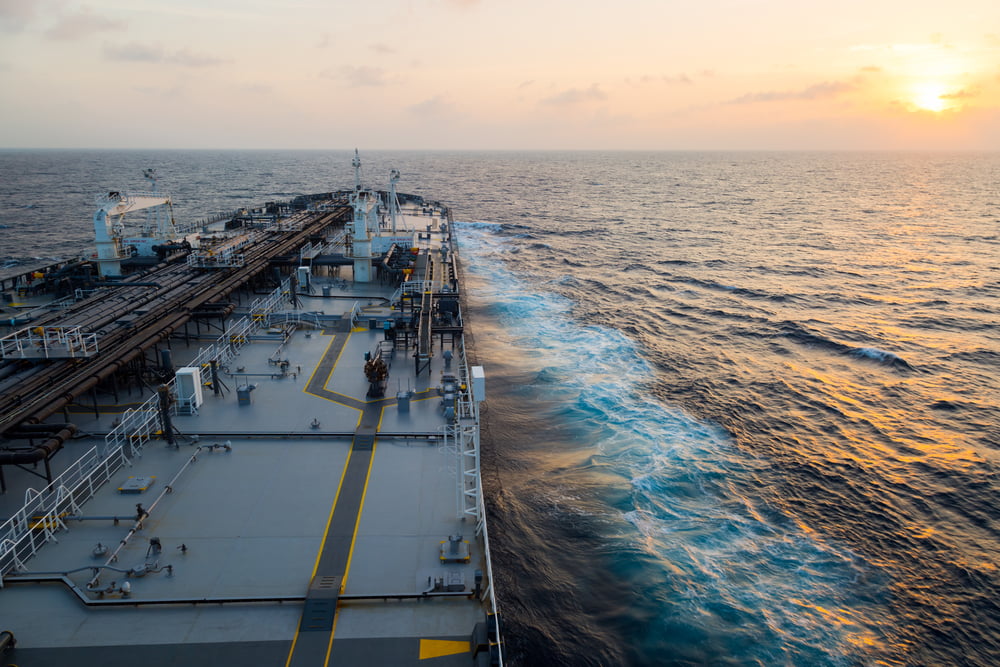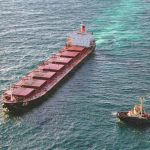The United States is imposing sanctions on 35 entities and vessels that play a critical role in transporting illicit Iranian petroleum to foreign markets. This action imposes additional costs on Iran’s petroleum sector following Iran’s attack against Israel on October 1, 2024, as well as Iran’s announced nuclear escalations, building upon the sanctions issued on October 11. Petroleum revenues provide the Iranian regime with the resources to fund its nuclear program, develop advanced drones and missiles, and provide ongoing financial and material support for the terrorist activities of its regional proxies.
“Iran continues to funnel revenues from its petroleum trade toward the development of its nuclear program, proliferation of its ballistic missile and unmanned aerial vehicle technology, and sponsorship of its regional terrorist proxies, risking further destabilizing the region,” said Acting Under Secretary for Terrorism and Financial Intelligence Bradley T. Smith. “The United States remains committed to disrupting the shadow fleet of vessels and operators that facilitate these illicit activities, using the full range of our tools and authorities.”
Today’s action is being taken pursuant to Executive Order (E.O.) 13902, which provides authority to the Secretary of the Treasury, in consultation with the Secretary of State, to identify and impose sanctions on key sectors of Iran’s economy. On October 11, 2024, the Secretary of the Treasury identified the petroleum and petrochemical sectors of the Iranian economy as subject to sanctions pursuant to section 1(a)(i) of E.O. 13902. The Office of Foreign Assets Control (OFAC) has released sanctions guidance for the maritime industry to aid in identifying new or common fact patterns that may be indicative of sanctions evasion, addressing common counterparty due diligence issues, and implementing best practices to promote sanctions compliance.
SHADOW FLEET TANKERS AND FACILITATORS
Iran relies upon a sprawling network of tankers and ship management firms in multiple jurisdictions to transport its petroleum to overseas customers — using tactics such as false documentation, manipulation of vessel tracking systems, and constant changes to the names and flags of vessels. The Marshall Islands-flagged JAYA (IMO: 9410387); Guyana-flagged PHONIX (IMO: 9198317); the Cook Islands-flagged BERTHA (IMO: 9292163), OLIVE (IMO: 9288265), YURI (IMO: 9235737), and MIN HANG (IMO: 9257137); the Sao Tome and Principe-flagged ELVA (IMO: 9196644) and CERES I (IMO: 9229439); the San Marino-flagged VANITY (IMO 9371608); the Liberia-flagged LADY LUCY (IMO: 9341512); the Belize-flagged VESNA (IMO: 9233349); the Honduras-flagged FT ISLAND (IMO: 9166675); the Iran-flagged MASAL (IMO: 9169421); and the Panama-flagged BLACK PANTHER (IMO: 9285756), LIONESS (IMO: 9285744), VERONICA III (IMO: 9326055), FIONA II (IMO: 9262766) and MEROPE (IMO: 9281891), have collectively shipped tens of millions of barrels of oil for Iran.
United Arab Emirates (UAE)-based Galileos Marine Services L.L.C manages the JAYA, formerly known as the MONOCEROS, which has been involved in transporting Iranian crude oil since at least 2022 and has changed its name or flag multiple times since to evade accountability. The JAYA has carried hundreds of thousands of metric tons of Iranian crude oil on behalf of U.S.-designated China Concord Petroleum Company (CCPC). CCPC was designated pursuant to E.O. 13846 on September 25, 2019 for engaging in a significant transaction for the transport of oil from Iran after the reimposition of sanctions on Iran.
Panama-based Ocean Glory Giant OGG SA owns and manages the MASAL, which carried more than a million barrels of Iranian crude oil on behalf of U.S.-designated CCPC, the National Iranian Oil Company (NIOC), and Naftiran Intertrade Company (NICO) as recently as July 2024. Hong Kong-based Gaffodil Co., Limited manages and operates the FT ISLAND, which carried more than 1.6 million barrels of Iranian condensate to buyers in China on behalf of CCPC and NIOC as recently as April 2024.
India-based Vision Ship Management LLP manages and operates the PHONIX, formerly known as the LUNA LAKE, which has carried millions of barrels of Iranian crude oil for CCPC since 2022. Vision Ship Management LLP also owns, manages, and operates the Cook Islands-flagged RIO NAPO (IMO: 9256913) and the Panama-flagged LARA II (IMO: 9321421). The RIO NAPO previously transported 35,000 metric tons of Iranian naphtha worth approximately $21.5 million to the UAE.
Galileos Marine Services L.L.C, Vision Ship Management LLP, Ocean Glory Giant OGG SA, and Gaffodil Co., Limited are being designated pursuant to E.O. 13902 for operating in the petroleum sector of the Iranian economy. The JAYA is being identified as property in which Galileos Marine Services L.L.C has an interest. The MASAL and the FT ISLAND are being identified as property in which Ocean Glory Giant OGG SA and Gaffodil Co., Limited have an interest, respectively. The PHONIX, the LARA II, and the RIO NAPO are being identified as property in which Vision Ship Management LLP has an interest.
Seychelles-registered Lufindo Holding Limited owns the ELVA, which in July 2023 was used by Iran to ship nearly two million barrels of Iranian light crude oil. The ELVA is managed and operated by Pakistan-based Inaya Ship Management Private Limited.
Liberia-registered Constellation Maritime Services Limited is the owner and operator of the LADY LUCY. The LADY LUCY carried Iranian fuel oil worth approximately $18.5 million to the UAE in July 2024, and transported an additional cargo of fuel oil worth approximately $17.5 million to the UAE again in August, both on behalf of NIOC.
Lufindo Holding Limited, Inaya Ship Management Private Limited, and Constellation Maritime Services Limited are being designated pursuant to E.O. 13902 for operating in the petroleum sector of the Iranian economy. The ELVA is being identified as property in which Lufindo Holding Limited has an interest. The LADY LUCY is being identified as property in which Constellation Maritime Services Limited has an interest.
People’s Republic of China (PRC)-based Shanghai Legendary Ship Management Company Limited manages and operates the BERTHA, the MIN HANG, and the VESNA. The BERTHA and the MIN HANG have been involved in the illicit transport of Iranian oil since at least 2022. The VESNA has similarly shipped millions of barrels of Iranian crude oil to the PRC since 2019 on behalf of NIOC and CCPC.
Shanghai Legendary Ship Management Company Limited is being designated pursuant to E.O. 13902 for operating in the petroleum sector of the Iranian economy. The BERTHA, the MIN HANG, and the VESNA are being identified as property in which Shanghai Legendary Ship Management Company Limited has an interest.
PRC-based Shanghai Future Ship Management Co Ltd manages and operates the VERONICA III and the MEROPE. The VERONICA III and the MEROPE have been involved in the illicit transport of Iranian oil on behalf of NIOC since at least 2022. The VERONICA III has transported hundreds of thousands of metric tons of Iranian crude oil on behalf of NIOC and CCPC.
Shanghai Future Ship Management Co Ltd has managed illicit shipments of Iranian oil for years; in 2021, a vessel managed by Shanghai Future Ship Management Co Ltd was seized by Indonesian authorities when it was detected transferring oil from an Iranian-flagged tanker owned by the National Iranian Tanker Company (NITC), causing an oil spill. Both vessels were attempting to conceal their identities by concealing their flags and turning off their automatic identification systems (AIS).
Shanghai Future Ship Management Co Ltd is being designated pursuant to E.O. 13902 for operating in the petroleum sector of the Iranian economy. The VERONICA III and the MEROPE are being identified as property in which Shanghai Future Ship Management Co Ltd has an interest.
Cayman Islands-registered, PRC-based Eunomia Limited owns the FIONA II. The FIONA II has been involved in transporting illicit Iranian oil since at least 2023. In July 2024, the FIONA II transported nearly two million barrels of Iranian crude oil to the PRC on behalf of NIOC.
Marshall Islands-registered Yurimaguas Ltd owns the YURI and the VANITY. The YURI and the VANITY have carried Iranian oil to the PRC since at least 2020; the YURI itself has shipped millions of barrels of Iranian crude oil for CCPC and NIOC.
Eunomia Limited and Yurimaguas Ltd are being designated pursuant to E.O. 13902 for operating in the petroleum sector of the Iranian economy. The FIONA II is being identified as property in which Eunomia Limited has an interest, and the YURI and VANITY are being identified as property in which Yurimaguas Ltd has an interest.
India-based Tightship Shipping Management (OPC) Private Limited manages or operates the OLIVE, BLACK PANTHER, and LIONESS, which have collectively carried tens of millions of dollars’ worth of Iranian oil for NIOC since at least 2022. The BLACK PANTHER has engaged in ship-to-ship transfers of Iranian oil with Iranian-flagged vessels.
Tightship Shipping Management (OPC) Private Limited is involved in the management of a fourth vessel, the Panama-flagged TONIL (IMO: 9307932), which is managed and operated by Ukraine-based Lightship Management Ltd and has skirted sanctions to carry millions of barrels of oil for Iran.
Tightship Shipping Management (OPC) Private Limited and Lightship Management Ltd are being designated pursuant to E.O. 13902 for operating in the petroleum sector of the Iranian economy. The OLIVE, the BLACK PANTHER, and the LIONESS are being identified as property in which Tightship Shipping Management (OPC) Private Limited has an interest. The TONIL is being identified as property in which Lightship Management Ltd has an interest.
Hong Kong-based Ceres Shipping Limited owns the CERES I. The CERES I has been involved in transporting Iranian oil since at least 2021. In January 2024, near Singapore, the CERES I transferred via ship-to-ship transfer nearly 300,000 metric tons of Iranian crude oil in the interest of U.S.-designated Jazira Das International Products Trading LLC, CCPC, and NIOC. Notably, in July 2024, the CERES I was involved in a collision with another oil tanker that caused an oil spill in international waters near Malaysia. At the time of the collision, the CERES I’s vessel tracking signals were inconsistent with its position, which inhibited communication with the other vessel.
Ceres Shipping Limited is being designated pursuant to E.O. 13902 for operating in the petroleum sector of the Iranian economy. The CERES I is being identified as property in which Ceres Shipping Limited has an interest.
SANCTIONS IMPLICATIONS
As a result of today’s action, all property and interests in property of the designated persons described above that are in the United States or in the possession or control of U.S. persons are blocked and must be reported to OFAC. In addition, any entities that are owned, directly or indirectly, individually or in the aggregate, 50 percent or more by one or more blocked persons are also blocked. Unless authorized by a general or specific license issued by OFAC, or exempt, OFAC’s regulations generally prohibit all transactions by U.S. persons or within (or transiting) the United States that involve any property or interests in property of designated or otherwise blocked persons. U.S. persons may face civil or criminal penalties for violations of E.O. 13902.
In addition, persons that engage in certain transactions with the individuals and entities designated today may themselves be exposed to sanctions or subject to an enforcement action. Non-U.S. persons are also prohibited from causing or conspiring to cause U.S. persons to wittingly or unwittingly violate U.S. sanctions, as well as engaging in conduct that evades U.S. sanctions. OFAC’s Economic Sanctions Enforcement Guidelines provide more information regarding OFAC’s enforcement of U.S. sanctions, including the factors that OFAC generally considers when determining an appropriate response to an apparent violation.
The power and integrity of OFAC sanctions derive not only from OFAC’s ability to designate and add persons to the Specially Designated Nationals and Blocked Persons (SDN) List, but also from its willingness to remove persons from the SDN List consistent with the law. The ultimate goal of sanctions is not to punish, but to bring about a positive change in behavior.
Source: US Department of The Treasury






